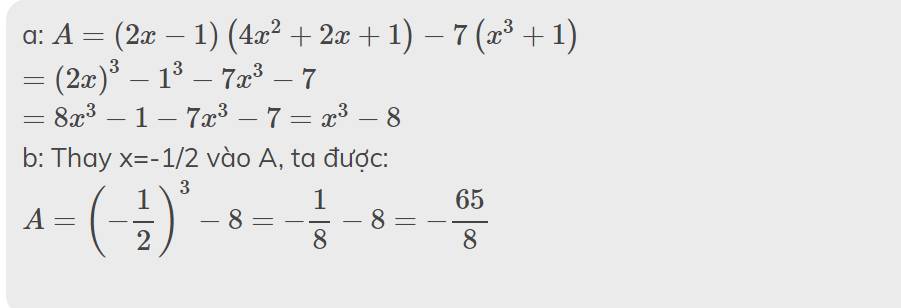Hãy nhập câu hỏi của bạn vào đây, nếu là tài khoản VIP, bạn sẽ được ưu tiên trả lời.

A là số chính phương, suy ra
\(x^2-6x+6=k^2\) \(\left(k\inℕ\right)\)
\(\Leftrightarrow\left(x-3\right)^2-3=k^2\Leftrightarrow\left(x-3\right)^2-k^2=3\Leftrightarrow\left(x-3-k\right)\left(x-3+k\right)=3\)
Vì \(x;k\inℕ\Rightarrow x-3-k< x-3+k\)nên ta có các trường hợp sau
\(\hept{\begin{cases}x-3-k=1\\x-3+k=3\end{cases}}\Leftrightarrow\hept{\begin{cases}x=5\left(tm\right)\\k=1\end{cases}}\)
\(\hept{\begin{cases}x-3-k=-3\\x-3+k=-1\end{cases}\Leftrightarrow\hept{\begin{cases}x=1\left(ktm\right)\\k=1\end{cases}}}\)
Vậy x=5 thì giá trị biểu thức A là số chính phương

a: \(A=\left(2x-1\right)\left(4x^2+2x+1\right)-7\left(x^3+1\right)\)
\(=\left(2x\right)^3-1^3-7x^3-7\)
\(=8x^3-1-7x^3-7=x^3-8\)
b: Thay x=-1/2 vào A, ta được:
\(A=\left(-\dfrac{1}{2}\right)^3-8=-\dfrac{1}{8}-8=-\dfrac{65}{8}\)


c: \(A=x^3-8=\left(x-2\right)\left(x^2+2x+4\right)\)
Để A là số nguyên tố thì x-2=1
=>x=3

\(a,\\ A=25x^2-10x+11\\ =\left(5x\right)^2-2.5x.1+1^2+10\\ =\left(5x+1\right)^2+10\ge10\forall x\in R\\ Vậy:min_A=10.khi.5x+1=0\Leftrightarrow x=-\dfrac{1}{5}\\ B=\left(x-3\right)^2+\left(11-x\right)^2\\ =\left(x^2-6x+9\right)+\left(121-22x+x^2\right)\\ =x^2+x^2-6x-22x+9+121=2x^2-28x+130\\ =2\left(x^2-14x+49\right)+32\\ =2\left(x-7\right)^2+32\\ Vì:2\left(x-7\right)^2\ge0\forall x\in R\\ Nên:2\left(x-7\right)^2+32\ge32\forall x\in R\\ Vậy:min_B=32.khi.\left(x-7\right)=0\Leftrightarrow x=7\\Tương.tự.cho.biểu.thức.C\)
b:
\(D=-25x^2+10x-1-10\)
\(=-\left(25x^2-10x+1\right)-10\)
\(=-\left(5x-1\right)^2-10< =-10\)
Dấu = xảy ra khi x=1/5
\(E=-9x^2-6x-1+20\)
\(=-\left(9x^2+6x+1\right)+20\)
\(=-\left(3x+1\right)^2+20< =20\)
Dấu = xảy ra khi x=-1/3
\(F=-x^2+2x-1+1\)
\(=-\left(x^2-2x+1\right)+1=-\left(x-1\right)^2+1< =1\)
Dấu = xảy ra khi x=1

Câu 1:
a) \(A=\left[\dfrac{2}{3x}-\dfrac{2}{x+1}.\left(\dfrac{x+1}{3x}-x-1\right)\right]:\dfrac{x-1}{x}\)
\(=\left[\dfrac{2}{3x}-\dfrac{2}{3x}+\dfrac{2x}{x+1}+\dfrac{2}{x+1}\right]\dfrac{x}{x-1}\)
\(=\left[\dfrac{2x}{x+1}+\dfrac{2}{x+1}\right]\dfrac{x}{x-1}\)
\(=\dfrac{2x+2}{x+1}.\dfrac{x}{x-1}\)
\(=\dfrac{2\left(x+1\right)}{x+1}.\dfrac{x}{x-1}\)
\(=2.\dfrac{x}{x-1}\)
\(=\dfrac{2x}{x-1}\)
Câu 1:
ĐKXĐ: \(x\notin\left\{0;-1;1\right\}\)
a) Ta có: \(A=\left(\dfrac{2}{3x}-\dfrac{2}{x+1}\cdot\left(\dfrac{x+1}{3x}-x-1\right)\right):\dfrac{x-1}{x}\)
\(=\left(\dfrac{2}{3x}-\dfrac{2}{x+1}\cdot\left(\dfrac{x+1}{3x}-\dfrac{3x\left(x+1\right)}{3x}\right)\right):\dfrac{x-1}{x}\)
\(=\left(\dfrac{2}{3x}-\dfrac{2}{x+1}\cdot\dfrac{x+1-3x^2-3x}{3x}\right):\dfrac{x-1}{x}\)
\(=\left(\dfrac{2}{3x}-\dfrac{2}{x+1}\cdot\dfrac{-3x^2-2x+1}{3x}\right):\dfrac{x-1}{x}\)
\(=\left(\dfrac{2\left(x+1\right)}{3x\left(x+1\right)}-\dfrac{2\cdot\left(-3x^2-2x+1\right)}{3x\left(x+1\right)}\right):\dfrac{x-1}{x}\)
\(=\dfrac{2x+2+6x^2+4x-2}{3x\left(x+1\right)}:\dfrac{x-1}{x}\)
\(=\dfrac{6x^2+6x}{3x\left(x+1\right)}:\dfrac{x-1}{x}\)
\(=\dfrac{6x\left(x+1\right)}{3x\left(x+1\right)}:\dfrac{x-1}{x}\)
\(=2\cdot\dfrac{x}{x-1}=\dfrac{2x}{x-1}\)
b) Để A nguyên thì \(2x⋮x-1\)
\(\Leftrightarrow2x-2+2⋮x-1\)
mà \(2x-2⋮x-1\)
nên \(2⋮x-1\)
\(\Leftrightarrow x-1\inƯ\left(2\right)\)
\(\Leftrightarrow x-1\in\left\{1;-1;2;-2\right\}\)
\(\Leftrightarrow x\in\left\{2;0;3;-1\right\}\)
Kết hợp ĐKXĐ, ta được: \(x\in\left\{2;3\right\}\)
Vậy: Để A nguyên thì \(x\in\left\{2;3\right\}\)

Câu 6:
ĐKXĐ: \(x\ne-\dfrac{1}{3}\)
Để \(\dfrac{9x+4}{3x+1}\in Z\) thì \(9x+4⋮3x+1\)
=>\(9x+3+1⋮3x+1\)
=>\(1⋮3x+1\)
=>\(3x+1\in\left\{1;-1\right\}\)
=>\(3x\in\left\{0;-2\right\}\)
=>\(x\in\left\{0;-\dfrac{2}{3}\right\}\)
mà x nguyên
nên x=0
Câu 2:
a: ĐKXĐ: \(x\notin\left\{2;-2;0\right\}\)
b: \(A=\left(\dfrac{1}{x+2}-\dfrac{2x}{4-x^2}+\dfrac{1}{x-2}\right)\cdot\dfrac{x^2-4x+4}{4x}\)
\(=\left(\dfrac{1}{x+2}+\dfrac{2x}{\left(x-2\right)\left(x+2\right)}+\dfrac{1}{x-2}\right)\cdot\dfrac{\left(x-2\right)^2}{4x}\)
\(=\dfrac{x-2+2x+x+2}{\left(x+2\right)\left(x-2\right)}\cdot\dfrac{\left(x-2\right)^2}{4x}\)
\(=\dfrac{4x\left(x-2\right)}{4x\left(x+2\right)}=\dfrac{x-2}{x+2}\)

Lời giải:
$A=(x^2+4y^2+4xy)+y^2+6x+16y+32$
$=(x+2y)^2+6(x+2y)+(y^2+4y)+32$
$=(x+2y)^2+6(x+2y)+9+(y^2+4y+4)+19$
$=(x+2y+3)^2+(y+2)^2+19\geq 0+0+19=19$
Vậy $A_{\min}=19$. Giá trị này đạt tại $x+2y+3=y+2=0$
$\Leftrightarrow y=-2; x=1$
Giúp em với
Bài 6
Ạ)Cho a2 +4b2+9c2=2ab+6bc+3ca. Tính giá trị của biểu thức
A=(a-2b+1)2022+(2b-3c-1)2023+(3c-a+1)2024
B) cho x,y thỏa mãn x2+2xy+6x+6y+2y2+8=0 tìm giá trị lớn nhất và nhỏ nhất của biểu thức A= x+y+2024

A = x2 - 6x + 6
= x2 - 2.x.3 + 32 - 3
=(x - 3)2 - 3
Ta có: \(\left(x-3\right)^2\ge0\forall x\)=> (x - 3)2 - 3 < 0 =>A < 0 =>A không là số chính phương(vì số chính phương luôn lớnhơnhoặc bằng0)
=> \(x\in\varnothing\)
Vậy không có số nguyên tố x nào thỏa mãn đề bài
À mình nhần rồi sr các bạn